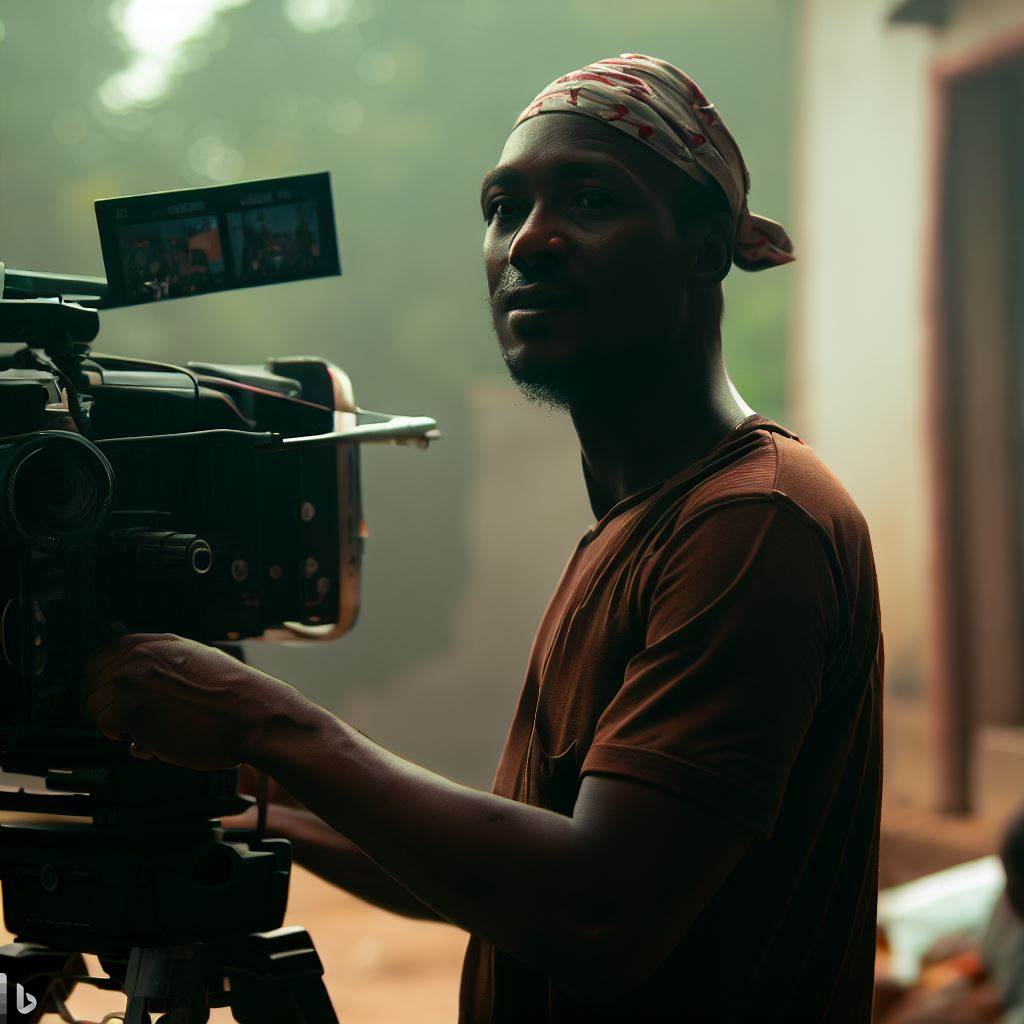Introduction
overview of cinematography in Nigeria
Cinematography in Nigeria has witnessed significant growth and development over the years. The impact of Modern Tech on Cinematography encourages productivity
The importance of technology in modern cinematography
Technology plays a crucial role in modern cinematography by enhancing production quality and efficiency.
impact of modern tech on Nigerian cinematography
This section will explore the impact of modern tech on Nigerian cinematography, highlighting its benefits and challenges.
Brief overview of cinematography in Nigeria:
- Cinematography in Nigeria has evolved into a dynamic and influential art form.
- It encompasses various genres, from Nollywood to independent filmmaking.
- Nigerian cinematographers play a pivotal role in shaping storytelling through visuals.
Importance of technology in modern cinematography:
- Technology is at the heart of contemporary cinematography, enhancing creativity and efficiency.
- Cameras, lighting, editing software, and post-production tools empower filmmakers to push boundaries.
- High-quality visuals and innovative techniques captivate audiences and elevate storytelling.
Preview of the impact of modern tech on Nigerian cinematography
- Advanced Cameras: Modern cameras offer superior image quality, enabling cinematic excellence.
- Visual Effects: CGI and post-production tools create immersive and stunning visual effects.
- Streaming Platforms: Online platforms provide wider exposure for Nigerian films, driving demand for quality cinematography.
- Virtual Production: Virtual sets and augmented reality transform film-making possibilities.
- Accessibility: Technology democratises film-making, allowing aspiring cinematographers to enter the industry.
In addition, modern technology is revolutionising cinematography in Nigeria, opening new horizons for creative expression and storytelling.
Nigerian cinematographers are harnessing these advancements to produce visually captivating and impactful films, further solidifying the country’s presence on the global cinematic stage.
Evolution of Cinematography in Nigeria
Historical overview of Nigerian cinema
- Nigerian cinema has a rich history that dates back to the late 19th century.
- It began with the screening of foreign films in makeshift venues across the country.
- In the 1960s, Nigeria gained independence, and the film industry started to flourish.
- This era saw the emergence of filmmakers like Hubert Ogunde and Ola Balogun.
Traditional cinematography techniques used in the past
- In the early days, Nigerian filmmakers relied on a simplistic approach to cinematography.
- Medium shots and static camera angles were commonly used to capture the action.
- Lighting was often rudimentary, with natural light being the primary source.
- Hand-held cameras were utilized to add a sense of realism to the storytelling.
Introduction of modern technology in the Nigerian film industry
- The 1990s marked a turning point with the introduction of modern technology in Nigerian cinema.
- This period saw the rise of digital cameras, allowing for easier and cheaper production.
- Digital editing software became widely accessible, enabling filmmakers to enhance their work.
- Special effects, such as CGI, started to be incorporated into Nigerian films.
- Cinematography became more dynamic, with the use of diverse camera angles and movement.
- Lighting techniques also improved, with the advent of artificial lighting setups.
- The use of drones in cinematography opened up new possibilities for Nigerian filmmakers.
The impact of modern tech on cinematography in Nigeria has been immense.
- It has allowed for the creation of visually stunning and technically superior films.
- Nigerian filmmakers now have the tools to compete with international counterparts.
- Modern technology has expanded the creative boundaries of Nigerian cinema.
- It has enabled filmmakers to experiment and push the boundaries of storytelling.
The evolution of cinematography in Nigeria has been a fascinating journey.
From the humble beginnings of makeshift screenings to the introduction of modern technology,
Nigerian cinema has come a long way. With each passing year, advancements in technology
continue to reshape the landscape of cinematography in Nigeria. The future of Nigerian cinema
looks promising, as filmmakers embrace the possibilities that modern tech has to offer.
Advancements in Camera Technology
Achieving high-quality cinematography greatly relies on the advancements in camera technology.
In Nigeria, the embrace of modern tech has revolutionized the way films are captured and produced.
The transition from analog to digital cameras
The transition from analog to digital cameras has been a game-changer in Nigerian cinematography.
Analog cameras were bulky and cumbersome, limiting filmmakers in terms of mobility and flexibility.
However, with the emergence of digital cameras, the industry witnessed a significant transformation.
Modern digital cameras are equipped with state-of-the-art features that enhance image quality and capture stunning visuals.
Filmmakers can now achieve greater control over exposure, colours, and overall image composition.
The transition to digital cameras has opened up a world of possibilities for Nigerian filmmakers, allowing them to bring their creative visions to life.
High-resolution filming capabilities and its impact
One of the most remarkable advancements in camera technology is the introduction of high-resolution filming capabilities.
This has had a profound impact on Nigerian cinematography, elevating the visual experience for viewers.
With high-resolution cameras, filmmakers can capture intricate details and textures with exceptional clarity.
The increased pixel count allows for sharper images, enhancing the overall visual appeal of films.
This technology has contributed to the growth of the Nigerian film industry, attracting international recognition and expanding its audience base.
Moreover, the availability of high-resolution cameras has empowered aspiring filmmakers to experiment and showcase their talents.
The democratization of advanced filming technology has opened doors for young Nigerian creatives, fostering a vibrant and diverse film landscape.
Introduction of lightweight and portable cameras
Another significant advancement in camera technology that has impacted Nigerian cinematography is the introduction of lightweight and portable cameras.
Traditionally, filmmaking involved bulky and heavy camera equipment that posed challenges in terms of mobility and accessibility.
However, the arrival of lightweight and portable cameras has revolutionized the filmmaking process in Nigeria.
These compact cameras allow filmmakers to capture footage from different angles and locations with ease.
They are particularly beneficial for capturing dynamic shots and filming in challenging environments.
The portability of these cameras has enabled Nigerian filmmakers to explore unconventional storytelling techniques and push the boundaries of visual storytelling.
Advancements in camera technology have had a profound impact on Nigerian cinematography.
The transition from analog to digital cameras has given filmmakers greater flexibility and control over their craft.
High-resolution filming capabilities have elevated the visual experience for viewers, while lightweight and portable cameras have expanded creative possibilities.
These advancements continue to shape and propel the Nigerian film industry forward, ensuring the production of visually captivating and impactful films.
Visual Effects and Special Effects
Rise of computer-generated imagery (CGI)
The advancements in modern technology have greatly impacted cinematography in Nigeria, especially with the rise of computer-generated imagery (CGI).
CGI has revolutionized the way visual effects are created and integrated into films.
Enhancement of storytelling through VFX and special effects
Visual effects (VFX) and special effects have become powerful tools in enhancing storytelling in Nigerian films.
Filmmakers now have the ability to create realistic and immersive worlds that were previously impossible to achieve.
Examples of Nigerian films utilizing advanced visual effects
Several Nigerian films have successfully utilized advanced visual effects to enhance their narratives and captivate audiences.
One notable example is the film “The Bling Lagosians,” which used VFX to create stunning cityscapes and bring the story to life.
Another example is the action thriller “Ojuju,” which used visual effects to portray the supernatural elements of the story, adding depth and excitement to the viewing experience.
Furthermore, the film “Mokalik” incorporated visual effects to showcase the bustling atmosphere of a mechanic workshop, showcasing the potential of VFX in enriching the overall cinematic experience.
These examples demonstrate the increasing reliance on visual effects and special effects in Nigerian cinema, highlighting the impact of modern technology on cinematography.
Overall, the impact of modern technology on cinematography in Nigeria, particularly when it comes to visual effects and special effects, has been immense.
The rise of computer-generated imagery has allowed filmmakers to create extraordinary visuals and immersive worlds that captivate audiences.
Furthermore, the enhancement of storytelling through VFX and special effects has opened up new possibilities in Nigerian cinema.
Filmmakers are now able to portray fantastical elements and create realistic environments that were previously limited by practical effects.
As showcased by films like “The Bling Lagosians,” “Ojuju,” and “Mokalik,” Nigerian filmmakers are embracing advanced visual effects and utilizing them to create visually stunning narratives.
With the continuous advancement of technology, the future of cinematography in Nigeria looks promising.
Filmmakers will have even more tools at their disposal to push the boundaries of creativity and deliver captivating visual experiences to audiences.
Read: Animation Directing: Nigeria vs. The Global Scene
Sound Technology and Editing
Improved sound recording and mixing techniques
- Advancements in sound technology have revolutionized the way sound is recorded and mixed in Nigerian cinema.
- Newer equipment and software have made it possible to capture high-quality sound on set.
- With better microphones and recording devices, filmmakers can now capture even the subtlest of sounds.
- This has enhanced the overall sound quality of Nigerian films, making them more immersive for audiences.
- Sound engineers can now easily manipulate, enhance, and clean up audio in post-production.
Enhancing the overall cinematic experience through sound
- Sound plays a crucial role in creating a captivating cinematic experience for the audience.
- Through the use of sound effects and background music, filmmakers can evoke specific emotions.
- Well-designed soundscapes immerse viewers into the world of the film, making it more engaging.
- Effective use of sound can heighten tension, emphasize dramatic moments, and enhance comedic timing.
- By carefully crafting the audio elements, filmmakers can create a more memorable and impactful film.
Importance of editing software in post-production
- Editing software is an essential tool in the post-production process of Nigerian films.
- Specialized editing software allows filmmakers to arrange and manipulate audio and visual elements.
- By editing sound, filmmakers can fine-tune the dialogue, adjust volume levels, and add sound effects.
- Software tools like equalizers and reverb plugins help create a balanced and immersive sound mix.
- Editing also allows for the synchronization of sound with visual cues, ensuring a seamless cinematic experience.
Advancements in sound technology and editing software have significantly impacted cinematography in Nigeria.
Improved sound recording techniques have elevated the quality of audio in Nigerian films, making them more immersive for audiences.
Sound is now a critical component in creating a captivating cinematic experience, as it enhances emotions and engages viewers.
Moreover, specialized editing software plays a vital role in post-production, allowing filmmakers to fine-tune audio elements and create a seamless audiovisual experience.
Overall, the impact of modern tech on sound technology and editing cannot be understated in the Nigerian film industry.
Read: Tools of the Trade: Essential Equipment for Nigerian Costume Designers

Accessibility and Distribution
Impact of streaming platforms on Nigerian cinema
- Streaming platforms have revolutionised the distribution landscape of Nigerian films.
- Platforms like Netflix and Amazon Prime have made it easier for Nigerian filmmakers to showcase their work.
- By being on these platforms, Nigerian films have gained a wider audience both locally and internationally.
- Streaming platforms have provided a platform for Nigerian films to be recognised and appreciated globally.
- The convenience of streaming platforms allows viewers to watch Nigerian films at their own pace and convenience.
Increased accessibility for Nigerian filmmakers
- The advancement of modern technology has made equipment more affordable and accessible for Nigerian filmmakers.
- Digital cameras and editing software have become more user-friendly and cost-effective.
- This accessibility has enabled Nigerian filmmakers to produce high-quality films with limited resources.
- Filmmakers now have the freedom to experiment with different styles and techniques, leading to increased creativity.
- As a result, more Nigerian filmmakers are able to tell their stories and contribute to the growth of the Nigerian cinema industry.
Global reach and exposure for Nigerian films
- Through the use of modern technology, Nigerian films have gained global reach and exposure.
- Nigerian films can now be easily distributed and viewed worldwide, breaking boundaries.
- This exposure has led to increased recognition and opportunities for Nigerian filmmakers.
- International film festivals and awards have started to acknowledge and appreciate Nigerian films.
- The global reach of Nigerian films has also attracted international collaborations and investments in the Nigerian cinema industry.
The impact of modern technology on cinematography in Nigeria has greatly enhanced accessibility and distribution.
Streaming platforms have opened doors for Nigerian filmmakers to showcase their work to a wider audience.
The increased accessibility of filmmaking equipment has empowered Nigerian filmmakers to produce high-quality films despite limited resources.
The global reach and exposure of Nigerian films have led to increased recognition and opportunities for the industry.
As technology continues to advance, we can expect even further growth and development in Nigerian cinema.
Read: Challenges Facing Music Publishers in Nigeria Today
Influence on Narrative and Storytelling
Introduction of unconventional storytelling techniques
- Use of nonlinear narratives to engage and intrigue the audience.
- Employment of flashbacks and flash-forwards to add depth and complexity to the plot.
- Experimentation with fragmented storytelling, challenging traditional linear structures.
Incorporation of augmented reality and virtual reality
- Integration of virtual elements into the narrative, creating immersive and interactive experiences.
- Enhancement of storytelling through the use of virtual environments and digital effects.
- Ability to transport viewers into fictional worlds, blurring the line between real and virtual.
Exploration of new narrative dimensions
- Introduction of complex and thought-provoking themes through technological advancements.
- Examination of the impact of technology on society, culture, and human relationships.
- Incorporation of digital storytelling techniques to convey powerful messages and emotions.
The impact of modern technology on cinematography in Nigeria has significantly influenced the narrative and storytelling aspects of filmmaking.
Filmmakers are constantly pushing boundaries, embracing new techniques, and utilizing cutting-edge technology to captivate audiences and create unique experiences.
The impact of modern tech on cinematography in Nigeria has brought about significant changes in narrative and storytelling techniques.
Filmmakers have embraced unconventional methods to engage audiences, introduced augmented and virtual reality to create immersive experiences, and explored new narrative dimensions using digital storytelling techniques.
These advancements have not only elevated Nigerian cinema but have also opened up a world of possibilities for filmmakers to tell captivating stories in innovative ways.
Read: Legal Aspects of Music Publishing in Nigeria
Challenges and Limitations
Cost implications of adopting modern technology
- The adoption of modern technology in cinematography comes with significant cost implications.
- Upgrading equipment and training personnel to handle advanced technology can be expensive.
- The high costs may discourage some filmmakers from incorporating modern tech into their productions.
- Limited budgets can restrict the use of advanced technology, limiting the cinematographic options in Nigeria.
- Investment in modern tech requires careful financial planning to ensure it is cost-effective and sustainable.
Limited access to advanced equipment in Nigeria
- Availability and access to advanced cinematography equipment can be a challenge in Nigeria.
- The lack of equipment hinders filmmakers from fully utilising modern technology in their productions.
- Limited access restricts the creative options available to Nigerian cinematographers.
- Filmmakers may have to rely on outdated or inadequate equipment, impacting the quality of their work.
- Efforts should be made to improve the availability and accessibility of advanced equipment in Nigeria.
Need for greater investment and infrastructure development
- The Nigerian film industry needs greater investment and infrastructure development to fully leverage modern technology.
- Adequate funding is essential to procure advanced equipment and train personnel.
- Infrastructure, such as studios and post-production facilities, must be developed to support the adoption of modern technology.
- Without proper infrastructure, the benefits of modern tech cannot be fully realised.
- The government and private sector should collaborate to invest in the necessary infrastructure and support the growth of the Nigerian film industry.
While the impact of modern technology on cinematography in Nigeria is promising, there are challenges and limitations that need to be addressed.
The cost implications of adopting modern technology can be prohibitive, limiting its use in film productions.
Limited access to advanced equipment further hinders the full utilization of modern tech by Nigerian filmmakers.
Greater investment and infrastructure development are essential to overcome these challenges and fully leverage the benefits of modern technology in cinematography.
With the proper support, Nigeria can enhance the quality and creativity of its film industry, making a significant impact both domestically and internationally.
Conclusion
Modern technology has had a significant impact on Nigerian cinematography.
The use of advanced cameras, editing software, and special effects has enhanced the quality of films produced in Nigeria.
This technological advancement has led to an increase in the production of high-quality movies, attracting international recognition and boosting the Nigerian film industry.
Embracing technology is crucial for the further growth of Nigerian cinematography. It allows filmmakers to explore new techniques, improve storytelling, and reach a wider audience.
The current achievements in Nigerian cinema deserve appreciation.
Talented filmmakers and actors have emerged, creating outstanding and critically acclaimed movies that showcase the rich Nigerian culture and stories.
Modern technology has revolutionized cinematography in Nigeria.
By embracing technology, the Nigerian film industry can continue to grow and gain global recognition, while celebrating the existing achievements.




